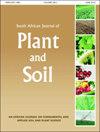南非西开普省轮作和耕作方式对秸秆分解和小麦生产性能的影响
IF 0.7
Q3 AGRONOMY
引用次数: 1
摘要
保护性农业依赖于残留物保留、作物轮作和减少耕作。轮作决定了残留物的类型,而耕作影响残留物的负载和分布。尽管作物残留物的保留通常是有益的,但残留物可能会带来挑战,包括在种植过程中阻碍种植园主生长和麦茬传播疾病。本研究确定了作物轮作和耕作对南非西开普省小麦(Triticum aestivum L.)残留物分解和响应的影响。研究了小麦的反应,以确定残留物分解与其农艺性能之间的关系。斯沃特兰和南开普省地区长期试验的作物轮作包括以下内容:小麦-医务人员、羽扇豆-小麦-油菜-小麦、油菜-小麦-羽扇豆小麦和小麦单一栽培。采用四种耕作方法种植作物:常规耕作(CT:凿犁,然后翻土/翻耕,建立播种机)、最少耕作(MT:凿犁、建立播种机,免耕(NT:用播种机直接钻孔)和免耕(ZT:用双圆盘播种机直接钻孔)。与单作小麦相比,轮作对残渣分解没有影响,但与苜蓿、羽扇豆和油菜轮作时,小麦叶面积和产量增加。ZT增加了残留量,提高了成苗率。ZT(50.9%)和NT(51.1%)比CT(34%)增加了残留物分解。残渣分解速度更快,土壤扰动更小。本文章由计算机程序翻译,如有差异,请以英文原文为准。
The effect of crop rotation and tillage practice on residue decomposition and wheat performance in the Western Cape, South Africa
Conservation agriculture relies on residue retention, crop rotation and reduced tillage. Crop rotation determines residue type, while tillage affects residue load and distribution. Although crop residue retention is often beneficial, residues can create challenges, including obstruction of planters during establishment and stubble-borne diseases. This study determined the effects of crop rotation and tillage on the residue decomposition and response of wheat (Triticum aestivum L.) in the Western Cape Province, South Africa. Wheat response was investigated to determine relationships between residue decomposition and its agronomic performance. Crop rotations in long-term trials in areas of the Swartland and southern Cape consisted of the following: wheat–medics, lupin–wheat–canola–wheat, canola–wheat–lupin–wheat, and a wheat monoculture. Crops were established with four tillage practices: conventional tillage (CT: chisel plough followed by soil inversion/ploughing, tine planter establishment), minimum tillage (MT: chisel plough, tine planter establishment), no-tillage (NT: direct drilling with tine planter) and zero tillage (ZT: direct drilling with double disc planter). Crop rotation had no effect on residue decomposition but increased wheat leaf area and grain yield when rotated with medics, lupin and canola when compared with monoculture wheat. ZT increased residue load and improved seedling establishment. ZT (50.9%) and NT (51.1%) increased residue decomposition compared with CT (34%). Faster residue decomposition could be achieved with less soil disturbance.
求助全文
通过发布文献求助,成功后即可免费获取论文全文。
去求助
来源期刊

South African Journal of Plant and Soil
Agricultural and Biological Sciences-Plant Science
CiteScore
1.90
自引率
11.10%
发文量
32
期刊介绍:
The Journal has a proud history of publishing quality papers in the fields of applied plant and soil sciences and has, since its inception, recorded a vast body of scientific information with particular reference to South Africa.
 求助内容:
求助内容: 应助结果提醒方式:
应助结果提醒方式:


